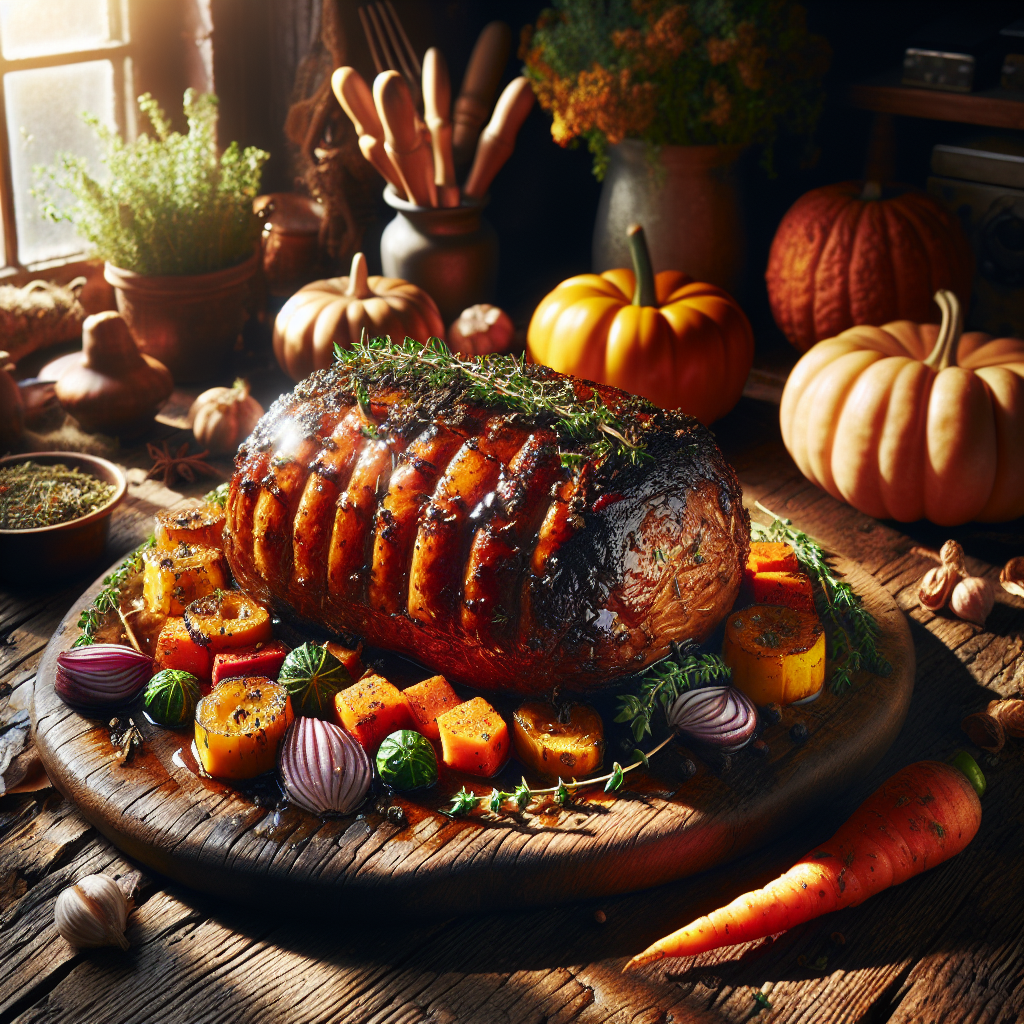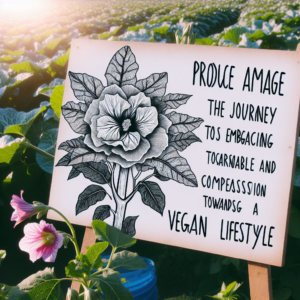Vegan Turkey: Introduction
Looking to add a twist to your Christmas feast? Look no further! We have something that will satisfy both your taste buds and your conscience – vegan turkey. Yes, you heard that right! A plant-based turkey alternative that will have you gobbling up every bite.
Whether you’re a long-time vegan or simply looking to try something new, this delectable creation promises to deliver all the savory flavors and juicy texture reminiscent of its traditional counterpart. Say goodbye to animal products and hello to a guilt-free feast that everyone can enjoy.

What is Vegan Turkey?
Definition
Vegan turkey, also known as “Tofurky,” is a plant-based alternative to traditional turkey made from various ingredients that mimic the taste, texture, and appearance of the real thing. The aim is to provide a cruelty-free option for those who follow a vegan lifestyle or prefer not to consume meat. Vegan turkey has become increasingly popular during holiday feasts and celebrations as a centerpiece that caters to diverse dietary preferences.
Ingredients
The exact ingredients of vegan turkey can vary depending on the brand and recipe used, but common ingredients include soy, wheat gluten (seitan), tofu, legumes, tempeh, jackfruit, and various spices and seasonings. These ingredients are combined to create a meat-like texture and flavor that closely resembles traditional turkey.
Nutritional Value
Vegan turkey offers several nutritional benefits. It tends to be lower in saturated fat and cholesterol compared to real turkey, which can be beneficial for cardiovascular health. It is usually rich in fiber, plant-based protein, and essential vitamins and minerals. Additionally, vegan turkey is often fortified with nutrients like vitamin B12 and iron, which are commonly found in animal products. However, it is essential to read the nutritional information provided on specific brands to ensure a well-rounded diet and meet individual dietary requirements.
How to Make Vegan Turkey
Choosing a Base
When making vegan turkey at home, you can choose from a variety of bases. Popular options include seitan, tofu, and jackfruit. Seitan, made from wheat gluten, provides a dense and chewy texture similar to meat. Tofu, when pressed and marinated, can be shaped into a turkey-like form and absorbs flavors well. Jackfruit, when cooked and shredded, has a stringy texture reminiscent of pulled pork and can be a flavorful base for vegan turkey.
Seasonings and Flavorings
To enhance the taste of vegan turkey, a blend of seasonings and flavorings can be used. Common ingredients include vegetable broth, soy sauce, garlic powder, onion powder, sage, thyme, rosemary, and nutritional yeast. These seasonings help replicate the traditional flavors associated with turkey while infusing the vegan alternative with a delicious and savory taste.
Cooking Methods
There are various cooking methods you can use to prepare vegan turkey. Some popular options include baking, roasting, grilling, or slow cooking. The cooking time and temperature may vary depending on the base you choose and the recipe you follow. It is essential to follow the specific instructions provided in the recipe to achieve the desired texture and flavor.
Popular Vegan Turkey Alternatives
Seitan Roast
Seitan roast is a popular vegan turkey alternative made from wheat gluten. It has a chewy texture akin to meat and can be seasoned and cooked to create a flavorful centerpiece. Seitan roast can be sliced and served with vegan gravy or used as a filling for sandwiches and wraps. It is a versatile and protein-rich option for those seeking a plant-based alternative to turkey.
Tofu Turkey
Tofu turkey is another commonly chosen option for vegan turkey. It involves pressing and marinating a block of tofu to absorb flavors and then shaping it into a turkey-like form. Tofu turkey can be baked, grilled, or roasted and is often served with a variety of vegetable-based side dishes and sauces. It offers a mild and versatile base that can be customized to suit individual tastes.
Jackfruit Turkey
Jackfruit turkey is a unique and flavorful vegan alternative to traditional turkey. When cooked and shredded, jackfruit’s natural texture resembles pulled pork. By marinating it in savory spices and sauce, it can be transformed into a delicious plant-based turkey substitute. Jackfruit turkey is often used in sandwiches, tacos, or served as a centerpiece in holiday feasts.
Benefits of Vegan Turkey
Health Benefits
Choosing vegan turkey offers several health benefits. It is generally lower in fat, especially saturated fat, compared to traditional turkey, which can be beneficial for heart health and weight management. Vegan turkey is typically high in fiber, plant-based protein, and essential nutrients such as vitamins C and E, potassium, and magnesium. It is also cholesterol-free, making it a suitable option for individuals with dietary restrictions or those looking to reduce their cholesterol intake.
Ethical Considerations
One of the key benefits of vegan turkey is its ethical considerations. By opting for a plant-based alternative, individuals can avoid contributing to the suffering and exploitation of animals. Vegan turkey allows individuals to enjoy a delicious holiday meal without the need for animal cruelty, making it a compassionate choice for those who prioritize animal welfare.
Environmental Impact
The environmental impact of vegan turkey is considerably lower than that of traditional turkey. Animal agriculture, particularly turkey farming, contributes to deforestation, water pollution, and greenhouse gas emissions. Choosing a plant-based alternative helps reduce the demand for animal farming, minimizing the strain on natural resources and the environment. Vegan turkey offers an eco-friendly option for individuals who wish to make more sustainable choices for their dietary needs.

Tips for Serving Vegan Turkey
Accompaniments
To enhance and complement the flavors of vegan turkey, consider serving it with a variety of accompaniments. Traditional Thanksgiving sides such as roasted vegetables, cranberry sauce, mashed potatoes, and stuffing are excellent options. Additionally, consider incorporating plant-based alternatives for classic side dishes, such as vegan gravy and dairy-free mashed cauliflower. These accompaniments will add depth and variety to the meal, providing a well-rounded dining experience.
Garnishes
Garnishes can add an extra touch of flavor and visual appeal to your vegan turkey. Fresh herbs, such as rosemary and thyme, can be used to garnish the turkey, adding both aromatic and aesthetic qualities. Sliced citrus fruits, such as oranges or lemons, can also be used as garnishes, providing a burst of tanginess and vibrant colors to the dish. Play around with different garnishing options to create a visually appealing and appetizing presentation.
Presentation Ideas
Presenting your vegan turkey can be an enjoyable part of the dining experience. Consider placing the turkey at the center of the table as a focal point and building the other dishes around it. Use decorative serving platters or a carved-out pumpkin as a unique serving vessel. Incorporating festive table decorations, such as fall-themed tablecloths, candles, or floral arrangements, will create a warm and inviting atmosphere. Remember to take photos and share your masterpiece on social media to inspire others with your plant-based feast!
Vegan Turkey Recipes
Classic Vegan Turkey Roast
Ingredients:
- Seitan or tofu as the base
- Vegetable broth
- Soy sauce
- Garlic powder
- Onion powder
- Sage
- Thyme
- Rosemary
- Nutritional yeast
Instructions:
- Preheat the oven to the recommended temperature.
- Prepare the base by either using seitan or pressing and marinating tofu.
- In a bowl, combine vegetable broth, soy sauce, garlic powder, onion powder, sage, thyme, rosemary, and nutritional yeast to create a flavorful marinade.
- Place the base in a baking dish and pour the marinade over it, ensuring it is well-coated.
- Cover the baking dish with aluminum foil to maintain moisture.
- Bake the vegan turkey roast according to the recommended cooking time, periodically basting it with the marinade to enhance the flavors.
- Once cooked, let the roast rest for a few minutes before slicing and serving.
Vegan Turkey Wellington
Ingredients:
- Puff pastry
- Portobello mushrooms
- Spinach
- Vegan cream cheese or dairy-free ricotta
- Onion
- Garlic
- Thyme
- Salt and pepper
Instructions:
- Preheat the oven to the recommended temperature.
- Saute the onions and garlic until translucent and aromatic.
- Add the portobello mushrooms, spinach, thyme, salt, and pepper to the pan, cooking until the moisture from the vegetables has evaporated.
- Roll out the puff pastry into a rectangle.
- Spread a layer of vegan cream cheese or dairy-free ricotta onto the pastry.
- Place the sautéed mushroom and spinach mixture on top of the cream cheese or ricotta.
- Fold the edges of the pastry over the filling, sealing all sides.
- Brush the pastry with a non-dairy milk or melted vegan butter for a golden finish.
- Bake the Wellington in the preheated oven until the pastry is golden and cooked.
- Allow the Wellington to cool slightly before slicing and serving.
Stuffed Vegan Turkey
Ingredients:
- Jackfruit as the base
- Vegan barbecue sauce
- Vegetable broth
- Onion
- Garlic
- Bell peppers
- Mushrooms
- Spinach
- Bread crumbs
- Sage
- Thyme
- Salt and pepper
Instructions:
- Preheat the oven to the recommended temperature.
- Drain and rinse the jackfruit, removing any hard cores, and shred it using a fork.
- In a frying pan, sauté onions, garlic, bell peppers, and mushrooms until soft and aromatic.
- Add the shredded jackfruit, spinach, bread crumbs, sage, thyme, salt, and pepper to the pan, cooking until well combined.
- Mix in vegan barbecue sauce and vegetable broth to bind the stuffing mixture together.
- Transfer the stuffing mixture into a baking dish, shaping it into a turkey-like form.
- Bake the stuffed vegan turkey in the preheated oven until browned and cooked through.
- Let the stuffed vegan turkey cool slightly before slicing and serving.

Frequently Asked Questions
Is Vegan Turkey Suitable for Everyone?
Vegan turkey is suitable for most individuals, including those following a vegan or vegetarian lifestyle. However, individuals with specific dietary restrictions or allergies should carefully check the ingredients of the chosen product or recipe to ensure it aligns with their needs. Additionally, pregnant or breastfeeding individuals should consult their healthcare provider before making any significant dietary changes.
Is Vegan Turkey Gluten-Free?
Many commercial vegan turkey options contain wheat gluten (seitan) as a base ingredient, making them unsuitable for individuals with gluten intolerance or celiac disease. However, there are gluten-free alternatives available, such as tofu or jackfruit-based vegan turkey recipes. It is essential to read the ingredient labels or search for gluten-free recipes to cater to specific dietary requirements.
Can I Freeze Leftover Vegan Turkey?
Yes, leftovers from vegan turkey can be stored in the freezer for future use. It is recommended to wrap the leftovers tightly in plastic wrap or place them in airtight containers before freezing. When ready to use, thaw the frozen vegan turkey in the refrigerator before reheating or incorporating it into other dishes.
Vegan Turkey: Conclusion
Elevate Your Holiday Feast with Vegan Turkey By opting for vegan turkey, you can create a compassionate and flavorful centerpiece for your holiday feasts. Vegan turkey provides a cruelty-free alternative to traditional turkey, offering similar taste, texture, and visual appeal. With options such as seitan roast, tofu turkey, and jackfruit turkey, there is a vegan turkey alternative to suit everyone’s preferences.
The health benefits, ethical considerations, and positive environmental impact make vegan turkey a standout choice for individuals seeking a sustainable and inclusive dining experience. By following the provided recipes and serving tips, you can impress your guests with a delicious and impressive plant-based feast. So, this holiday season, explore the versatility of vegan turkey and make your table a celebration of compassion, health, and taste.





